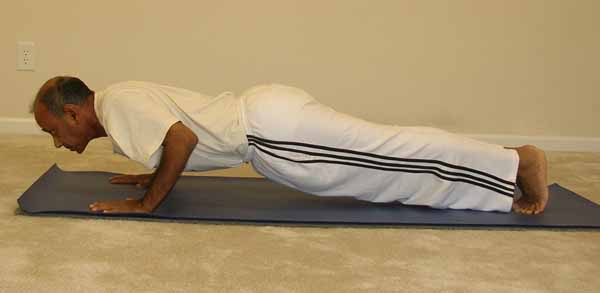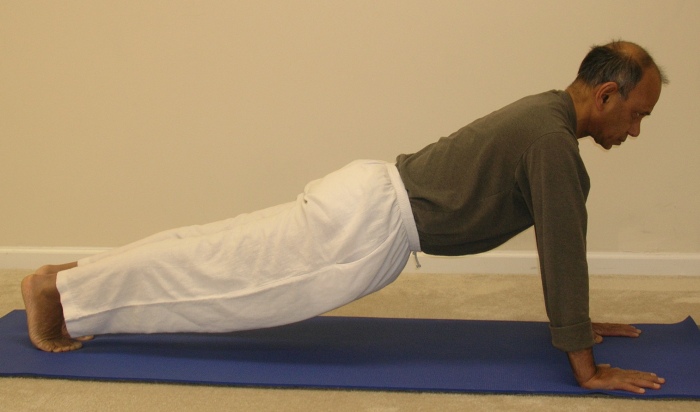Yoga offers a multitude of benefits at all levels – physical, physiological, mental, emotional, spiritual and deeper. This article in the Yoga Journal lists 38 different ways in which yoga keeps you fit and healthy at various levels. However, most of the these benefits can be combined under these four broad categories:
- Strength
- Flexibility
- Endurance
- Balance
In today’s post, I am going to focus on strength and see how yoga helps provides this benefit at various levels – physical, mental, emotional and spiritual.
Physical strength
When we talk of strength at the physical level we are normally concerned with muscular strength. It is muscular strength that helps us overcome resistance that the body encounters while performing a physical task.
For example, currently, due to my recent surgery on my right shoulder , I have limited strength in my right arm and shoulder. As a result, I have a hard time lifting even the kitchen garbage bag and dumping it into the dumpster. As I continue with my yoga practice, and occasional physical therapy, I am gradually regaining my strength.
 Chaturanga (Four-limbed Staff Pose)
Chaturanga (Four-limbed Staff Pose)Let us look at the yoga pose "chaturanga-dandasana" (the four-limbed staff pose). Let us start in the straight ‘dandasana’ (plank pose). You may recall that I talked about these two poses in my last post on the Chakrasana as well. Our ability to get into this pose is determined by our upper body strength in overcoming the resistance posed by the weight of our body. When the elbows are straight, we are able to overcome the resistance relatively easily and get into the plank pose. Now, let us try to bend the elbows slowly and try to bring the body into the four-limbed staff pose where the body is fully parallel to the floor and the elbows are bent and tucked in close to the body. As you will notice, the body is posing a much greater resistance and our muscular strength in the hands, arms and shoulders is severely tested. Once you are in this pose, then trying to get back into the plank pose requires even greater muscular strength compared to what we needed going down into the four-limbed pose.
 Dandasana (Plank Pose)
Dandasana (Plank Pose)Beginning yoga students may find these two poses relatively daunting as they may lack the requisite muscular strength. However, after regular yoga practice, most people begin to get into these poses fairly comfortably. A regular yoga practice that includes a variety of yoga asanas is the key to building adequate strength to get into many of the poses with relative ease.
Mental strength
It is mental strength that helps us overcome difficult situations in life. If we are mentally weak, we may give in and give up in the face of challenges that life presents us. Many people make New Year resolutions. However, soon their mental determination to follow through on their resolve evaporates and they fall back to old habits. That is a clear sign of mental weakness. It requires mental strength to stick to a resolution. When you are mentally strong, you are able to handle ups and downs in life, in stock market, in work performance etc. without feeling stressed out. Stress is a sign of mental weakness.
While practicing yoga, we maintain full awareness (also called mindfulness) of the body, breath and the mind. It is this awareness that gradually helps us become mentally strong. Once the mind is strong, we are able to maintain a regular yoga practice. So, the practice of yoga and mental toughness feed into each other and help each other grow.
Emotional strength
Emotional strength implies our ability to stay calm in the face of adversity caused by people, places, events and circumstances in life. In the Indian spiritual literature, six negative emotions are labeled as the enemies of human mind; they are – kama (lust/cravings), krodha (anger), lobha (greed), moha (delusion), mada (arrogance/false pride), and matsarya (jealousy). These negative tendencies are considered an impediment to our personal and spiritual growth.
The practices of pranayama (breathing practices) and meditation play a vital role in building emotional stability and strength. In this article I have explained how the practice of pranayama can help us control our emotions.
As per Patanjali (Yoga Sutra 2.28), the practice of yoga will eliminate all our impurities of the mind. Impurities of the mind include not just these negative emotions, but also our past bad karma (samskaras or past impressions in the mind). Yoga practice helps us reduce the influence of the ego in favor of the pure intellect. When the actions are performed through the dominance of the intellect we automatically reduce our tendency to develop any one of these negative emotions.
Spiritual strength
Patanjali, in the Yoga Sutras, tells us that our true identity is not our mind-body complex but, in fact, we are nothing but pure consciousness. In the yoga literature, this pure consciousness is labeled as "purusha" whereas everything else, which includes the mind-body complex, is labeled as "prakriti". Spiritual strength implies that we begin to realize our true identity as pure consciousness. When that happens, our involvement with the ego diminishes, and we begin to operate more from our pure intuitive wisdom. Once again, in the same sutra referenced above (sutra 2.28), Patanjali further states that through the practice of yoga the light of wisdom shines through and we can realize our true identity. When we realize who we are, we become free of the usual stresses and strains of life and can live a life full of natural creativity and joy.
Please share your thoughts on this important component of the yoga practice – building strength at various levels. Tell us how your yoga practice has helped you in this regard.
For the last few years I have been dealing with a lot of depression and anxiety, binge eating episodes of bad food that took a toll on my fitness and weight. My relationships with my family deteriorated tremendously.I have been practicing yoga for 5 days straight, 1.5 hours each session as part of a 21 day yoga challenge offered by Subhash and even though it’s too early to say, I already feel some benefits. My physical strenght is slowly tunning to what it should be. The dietary changes introduced in my life are playing a positive impact on my weight. I am really looking forward to use the benfits of yoga to make positive and meaningful changes to my mental, emotional and spiritual strenghts.
Thanks Subhash and the rest of the students of the class for making me feel welcome!
Hi Juan,
Thanks for your kind feedback. I am so glad to see that you are already finding the yoga practice helpful. I look forward to your continued participation and hopefully you will begin to realize all the benefits that the practice of yoga is known to bring.
Hi Subhash,
I am the one who should be thanking you for this opportunity. I am really excited to discover more about yoga and about myself.